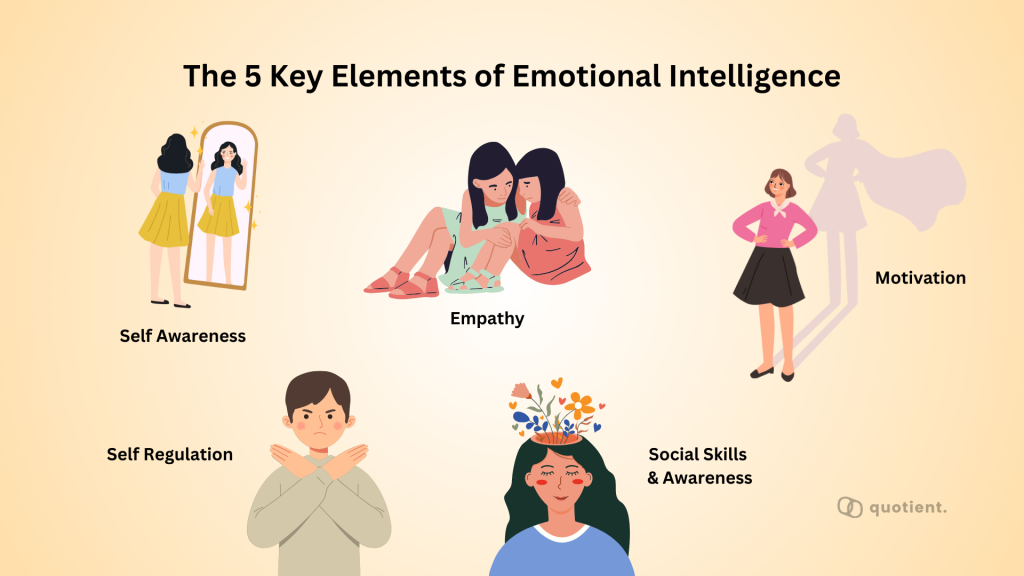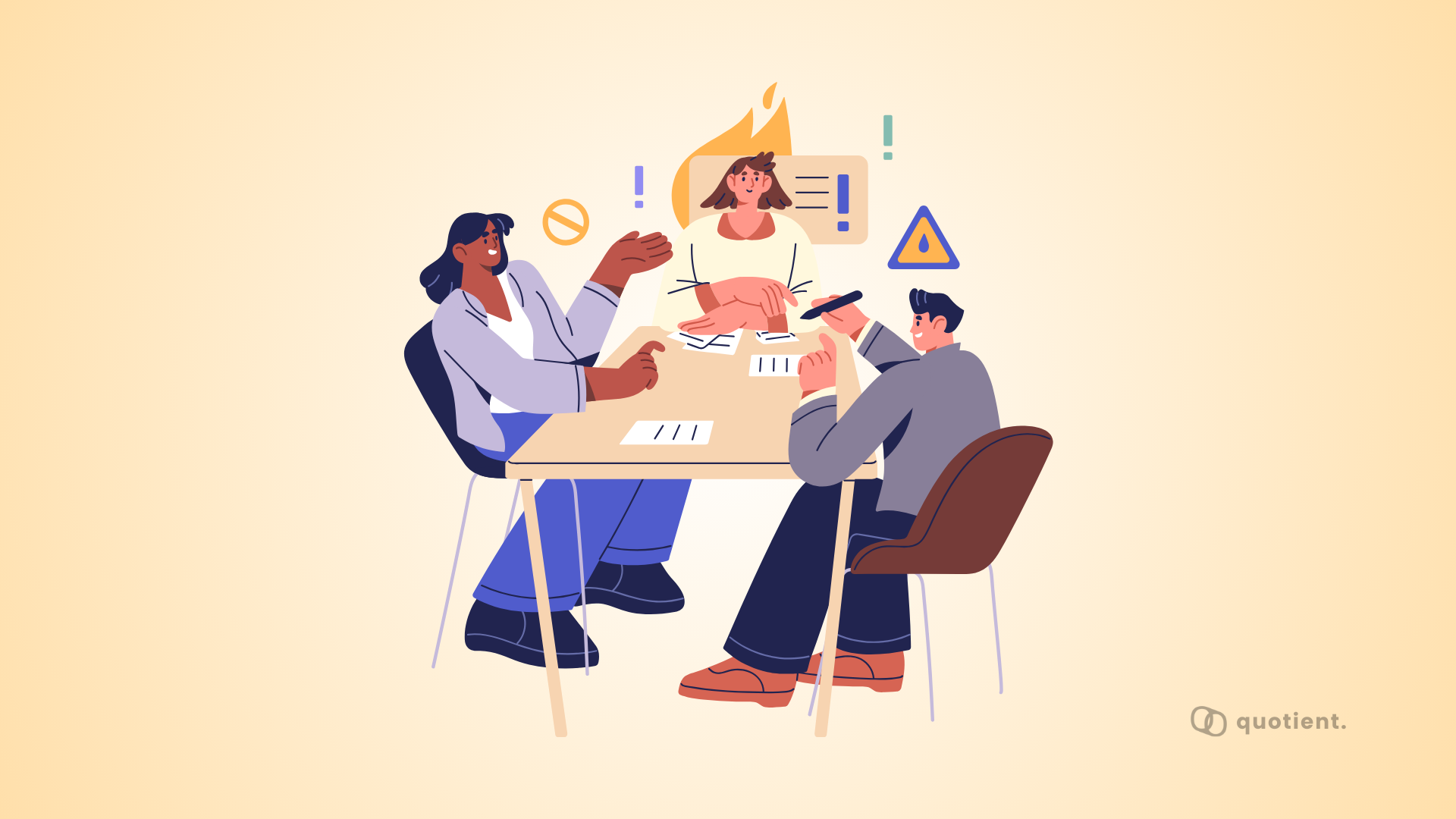Let’s talk about two common stories in the workplace:
1 The Perfect Job Ad: Most of the time, we see job advertisements listing great communication, problem-solving, and leadership skills as key attributes for the open role. However, these three skills are all rooted in one fundamental trait: emotional intelligence.
2 The Heated Meeting: In a meeting where arguments happen frequently among team members, relationships get strained, project timelines suffer, and the work environment becomes toxic. During such a heated meeting, instead of snapping back at a colleague, take a moment to breathe and respond calmly. Acknowledge their point of view, and then share your perspective. This not only defuses the tension but also shows you’re in control of your emotions.
Both scenarios highlight the importance of emotional intelligence (EI). Now, let’s deep dive into what EI is all about.
What is Emotional Intelligence?
Emotional Intelligence is all about recognizing, understanding, and managing your own emotions, as well as the emotions of others. It’s like having a superpower that helps you navigate the complexities of human interactions.
EI comprises two key aspects:
Intrapersonal Intelligence: Understanding others’ emotions and motivations.
Interpersonal Intelligence: Self-awareness and understanding your own emotions.
Daniel Goleman, a pioneer in EI, breaks it down into five key components:
1 Self-Awareness: Knowing your emotions and their impact.
2 Self-Regulation: Controlling or redirecting disruptive emotions.
3 Motivation: Being driven to achieve for the sake of achievement.
4 Empathy: Understanding the emotions of others.
5 Social Skills: Managing relationships to move people in desired directions.

Why is Emotional Intelligence Important in the Workplace?
EI can make or break your career. Here’s why:
1. Enhances leadership: Leaders with high EI are more effective because they can inspire and motivate their teams. They handle stress well and make thoughtful decisions.
“The greatest leaders are not necessarily the ones who do the greatest things. They are the ones that get people to do the greatest things.” – Ronald Reagan
2. Improved Communication: When you understand your own emotions and those of others, you communicate more effectively. This leads to fewer misunderstandings and conflicts.
“The single biggest problem in communication is the illusion that it has taken place.” – George Bernard Shaw
3. Enhanced Teamwork: Teams with high EI collaborate better. They respect each other’s perspectives and work through conflicts constructively.
“Teamwork begins by building trust. And the only way to do that is to overcome our need for invulnerability.” – Patrick Lencioni
4. Increased Resilience: Employees with high EI are more resilient to stress and setbacks. They bounce back quicker and maintain a positive attitude.
“It’s not the load that breaks you down, it’s the way you carry it.” – Lou Holtz
5. Recognizing and Resolving Conflict: EI helps in recognizing conflicts early and resolving them in a fair and even-handed way.
“The quality of our relationships determines the quality of our lives.” – Esther Perel
6. Higher Morale: Leaders with high EI can boost morale by understanding and acting on their team’s emotional needs, helping them tap into their professional potential.
“In the end, it’s not the years in your life that count. It’s the life in your years.” – Abraham Lincoln
The Role of Management in Fostering Emotional Intelligence
Managers play a crucial role in cultivating an emotionally intelligent workplace. They should:
- Prioritise emotional intelligence: Recognise the value of EI alongside traditional skills.
- Lead by example: Demonstrate emotional intelligence in their own behaviour.
- Provide opportunities for development: Offer training and support for employees to enhance their EI.
- Create a supportive culture: Foster open communication and empathy within the team.
How to Boost Your Emotional Intelligence
Anyone can improve their emotional intelligence. Here are some tips:
Enhance social skills: Improve your communication and interpersonal skills.
Practice self-awareness: Regularly reflect on your emotions and triggers.
Develop self-regulation: Learn techniques to manage stress and emotions.
Stay motivated: Set goals and celebrate achievements.
Cultivate empathy: Listen actively and try to understand others’ perspectives.
“It’s not the load that breaks you down, it’s the way you carry it.” – Lou Holtz
Quotient: Your EI Companion
Understanding and managing your emotions can be challenging, but technology can help. The Quotient app is designed to describe your emotions according to your situation, helping others understand what you’re going through. It’s also categorized with lots of quotes to uplift and motivate you, enhancing your emotional intelligence journey.
Diving Deeper into Emotional Intelligence
Want to learn more about emotional intelligence? I’ve discovered some fantastic resources that delve into this fascinating topic.
- Emotional intelligence workplace complete guide
- Emotional intelligence in the workplace
- Personal growth and emotional intelligence
Emotional Intelligence is more than just a buzzword; it’s a vital skill for anyone looking to succeed in today’s workplace. By developing your EI, you can improve your leadership abilities, communicate better, foster stronger teamwork, and increase your resilience. In today’s world, AI can be intelligent but can’t be emotionally intelligent. So next time you’re in a challenging situation at work, remember: your emotional intelligence might just be your biggest asset.
“In the end, it’s not the years in your life that count. It’s the life in your years.” – Abraham Lincoln

Leave a Reply